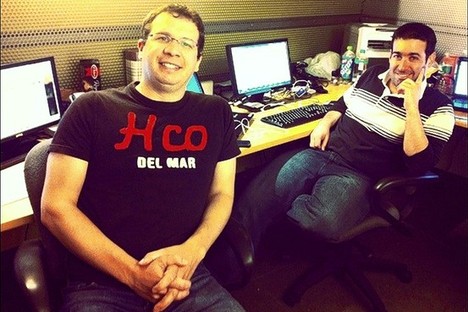 “Start-up BiteHunter launched with three employees. Above, co-founders Gil Harel, left, and Ido Shilon.” Source of caption and photo: online version of the WSJ article quoted and cited below.
“Start-up BiteHunter launched with three employees. Above, co-founders Gil Harel, left, and Ido Shilon.” Source of caption and photo: online version of the WSJ article quoted and cited below.
Lower costs to entry means more start-ups and that means more innovation, ceteris paribus. All good. For the labor market, there will be fewer initial jobs per start-up. But there will be more start-ups, and more opportunity for erstwhile laborers to themselves become entrepreneurs. So maybe still all good.
(p. B5) New businesses are getting off the ground with nearly half as many workers as they did a decade ago, as the spread of online tools and other resources enables start-ups to do more with less.
The change, which began before the recession, may be permanent, according to some analysts.
. . .
Rather than purchasing the tools and manpower needed to run their companies, more small firms are renting, sharing or outsourcing resources, typically through online services, according to Steve King, a partner at Emergent Research, a research and consulting firm for small businesses.
. . .
Last year, Gil Harel launched BiteHunter, a search engine for restaurant discounts, with just three employees. Based in New York, the site used shared screens and other communications tools to work with developers in Russia, Uruguay and Israel.
“Just to build the infrastructure to get a business off the ground used to take a lot of money and people. But things that you couldn’t do in the past, you can now do on your own,” Mr. Harel says.
For the full story, see:
ANGUS LOTEN. “With New Technology, Start-Ups Go Lean; Web-Based Services Mean Fewer Workers Needed.” The Wall Street Journal (Thurs., September 15, 2011): B5.
(Note: ellipses added.)

